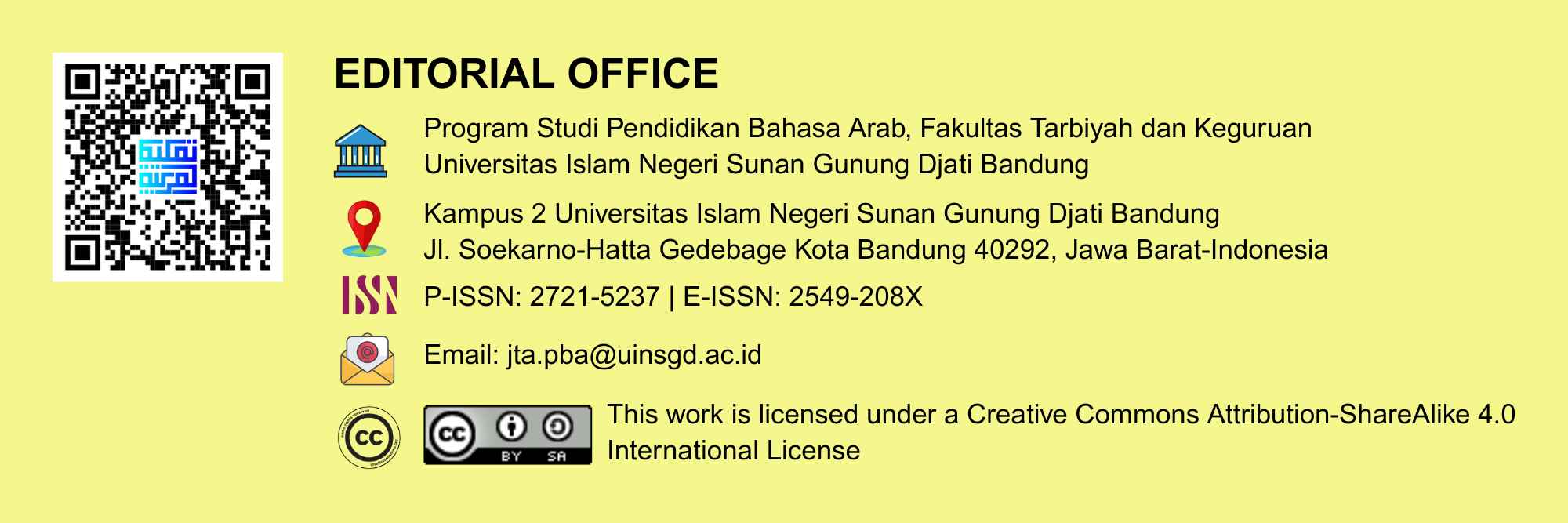Improving 21st Century Students' Learning Skills through the Group Investigation Cooperative Learning Model in Arabic Classes
DOI:
https://doi.org/10.15575/jpba.v8i2.34552Keywords:
Arabic Learning, Cooperative Learning, Group Investigation, 21st Century Students' SkillsAbstract
References
Adam, M. Z., Jundi, M., Ali, I., Kadir, S. D., & Laubaha, S. A. (2022). Himpunan Mahasiswa Jurusan dan Matrikulasi Bahasa Arab bagi Mahasiswa Baru. Jurnal Naskhi: Jurnal Kajian Pendidikan Dan Bahasa Arab, 4(1), 1-9. https://doi.org/10.47435/naskhi.v4i1.798
Ainin, M. (2016). Metodologi Penelitian Bahasa Arab. Bintang Sejahtera.
Alahmad, A., Stamenkovska, T., & Gyori, J. (2021). Preparing Pre-service Teachers for 21st Century Skills Education: A Teacher Education Model. GILE Journal of Skills Development, 1(1), 67–86. https://doi.org/10.52398/gjsd.2021.v1.i1.pp67-86
Ali, I. (2021). Pembelajaran Kooperatif (Cooperative Learning) Dalam Pengajaran Pendidikan Agama Islam. Jurnal Mubtadiin, 7(1), 247-264. Retrieved from https://journal.an-nur.ac.id/index.php/mubtadiin/article/view/82
Ali, I., Jundi, M., Adam, M. Z., Laubaha, S. A., & Kadir, S. D. (2022). Implementasi KMA 183 dalam Penyajian Materi Bahasa Arab Berbasis E-Learning Di MAN 1 Kabupaten Gorontalo. PIWULANG Jurnal Pendidikan Agama Islam, 4(2). 146-160 https://doi.org/10.32478/piwulang.v4i2.969
Amin, M. A., Hasibuan, R., & Jundi, M. (2023). Optimizing Student's Reading Skill: An Experimental Study on The Influence of Comic Media on Arabic Language Learning. El-Mahara, 1(2), 55-68. https://doi.org/10.62086/ej.v1i2.500
Anhusadar, L. (2020). Persepsi Mahasiswa PIAUD terhadap Kuliah Online di Masa Pandemi Covid 19. KINDERGARTEN: Journal of Islamic Early Childhood Education, 3(1), 44-58. https://doi.org/10.24014/kjiece.v3i1.9609
Ardiansyah, A. A., Musthafa, I., & Hermawan, A. (2023). Analysis of The Dialogical Narration in The Story of Prophet Yusuf in The Quran. Ta’lim al-’Arabiyyah: Jurnal Pendidikan Bahasa Arab & Kebahasaaraban, 7(2), 278–298. https://doi.org/10.15575/jpba.v7i2.25684
Downloads
Published
How to Cite
Issue
Section
Citation Check
License
Copyright (c) 2024 Suharia Sarif, Yasmadi, Muhammad Jundi, Titi Fitri, Ira Safira Haerullah, Renni Hasibuan, Nabil Gustian

This work is licensed under a Creative Commons Attribution-ShareAlike 4.0 International License.
Authors who publish in Ta'lim al-'Arabiyyah: Jurnal Pendidikan Bahasa Arab dan Kebahasaaraban agree to the following terms:
- Authors retain copyright and grant the journal right of first publication with the work simultaneously licensed under a Creative Commons Attribution-ShareAlike 4.0 International (CC BY-SA 4.0) License that allows others to share the work with an acknowledgment of the work's authorship and initial publication in this journal.
- Authors are able to enter into separate, additional contractual arrangements for the non-exclusive distribution of the journal's published version of the work (e.g., post it to an institutional repository or publish it in a book), with an acknowledgment of its initial publication in this journal.
- Authors are permitted and encouraged to post their work online (e.g., in institutional repositories or on their website) prior to and during the submission process, as it can lead to productive exchanges, as well as earlier and greater citation of published work (See The Effect of Open Access).
![]()
Ta'lim al-'Arabiyyah: Jurnal Pendidikan Bahasa Arab dan Kebahasaaraban is licensed under a Creative Commons Attribution-ShareAlike 4.0 International License.
Based on a work at https://journal.uinsgd.ac.id/index.php/Talim







